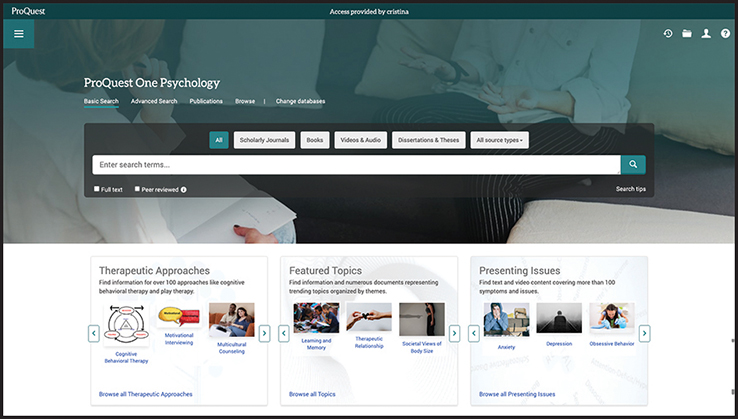ProQuest One Psychology | eReview
ProQuest One Psychology is an invaluable tool that provides access to a comprehensive collection of multiformat materials centered on psychology and counseling curriculums.
ProQuest One Psychology
CONTENT ProQuest One Psychology provides access to a comprehensive collection of multiformat materials centered on psychology and counseling curriculums. This resource supports a variety of users, including undergraduate and graduate psychology students, scholars, and faculty. The subject matter is designed to assist students in exploring research methodologies, theories, therapies, and schools of thought.
Content includes over 1,200 full-text scholarly journals, ranging from the Journal of Youth and Adolescence to the New England Journal of Medicine. In addition to the academic journals, researchers can access over one million psychology-related articles from newspapers, magazines, and trade journals such as The Atlantic, The Guardian, and Psychology Today. The collection includes over 5,000 books, including handbooks and reference works, together with over 70,000 dissertations and theses. In addition to print, the database provides access to over 3,000 videos (lectures, panel discussions, real-world video counseling sessions) and 1,700 transcripts from counseling sessions. The collection is rounded out with 1,100 archival items—books, videos, and notes on more than 30 pivotal historical experiments that have shaped the discipline.
USABILITY The well-organized home page features a prominent search bar with options for basic keyword and advanced searches. The default keyword search provides options for filtering by type (scholarly journals, books, videos and audio, dissertations and theses, etc.) and specifying full-text or peer-reviewed documents. Response time is excellent, and results can be cited, emailed, and saved. Facets in the left-hand navigation menu allow for limiting by source type, publication date, subject, research concept, population group, audience, language, publication title, and content type. Institutions that subscribe to American Psychological Association (APA) products will find APA content fully integrated into search results and topic pages. This information is hidden for those institutions that do not subscribe to APA products.
While all resources are accessible through a basic or advanced search, users can also draw on ProQuest’s topic pages to craft research inquiries and narrow their searches. Topic pages present a one-stop-shopping view of over 1,000 topics, ranging from anxiety and depression to cognitive behavioral therapy and play therapy. Each topic page gives an overview of the topic, followed by lists of journal articles, books, related subjects, related therapy videos, and more.
Topic pages are grouped into six classes: “Therapeutic Approaches,” “Featured Topics,” “Presenting Issues,” “Tests & Measures,” “Research Concepts,” and “Historical Psychological Experiments.” Researchers can access these topic groupings from tiles and knowledge carousels on the home page. Information within the topic groupings is outstanding, offering a well-organized and user-friendly layout and access to robust materials that can be difficult to locate through other means. “Tests and Measures,” for example, presents an alphabetized list of a wide range of psychological tests, linking to the tools themselves and offering background information and related dissertations, scholarly journal articles, and archival documents.
PRICING Pricing for the resource will vary and is based on factors such as but not limited to the type of institution, geographic location, and size of the specific location(s).
VERDICT ProQuest One Psychology is an invaluable tool for students, academicians, practitioners, and educators looking to learn more about research methods, trends, and strategies for approaching fieldwork and therapeutic practice. An essential purchase for institutions with undergraduate or graduate psychology or social work programs.
RELATED
ALREADY A SUBSCRIBER? LOG IN
We are currently offering this content for free. Sign up now to activate your personal profile, where you can save articles for future viewing










Add Comment :-
Comment Policy:
Comment should not be empty !!!